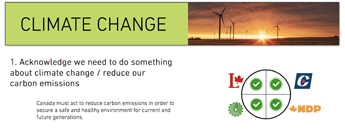As the climate crisis intensifies globally, environmental issues are at the forefront of political campaigns. A website run by a Dal professor helps voters decipher political parties’ stance on the issues to make an informed decision.
was first launched before the 2019 Canadian federal election. With another federal election campaign now in its final days, Derek Tittensor, an associate professor of Biology and the Jarislowsky Chair in Marine Ecosystem Forecasting, enlisted the help of undergraduate student Ava Sergio to refresh the website to reflect the parties’ positions going into the 2021 election.
The website covers 28 different environmental policy issues, ranging from oil and gas use to biodiversity. Along with an explanation, a non-partisan and easy-to-understand chart indicates the position of the Liberals, Conservatives, NDP and the Greens on the issue.
“It’s really important that we’re not biased. That we just present information. We do it in a non-partisan way,” says Dr. Tittensor.
 He says while there are several resources similar to EnviroVote for other political issues like economics, there wasn’t an easy way to compare candidate’s climate policies.
He says while there are several resources similar to EnviroVote for other political issues like economics, there wasn’t an easy way to compare candidate’s climate policies.
“There was not a single place where you could find out very quickly how different parties compare on environmental issues."
Creating an accessible resource
With help from his students, he compiled the critical environmental issues the day in hopes of making the information more accessible.
“I would like any Canadian citizen or person whose interested in voting, which we all should be, obviously, engaging in the democratic process, to have these kinds of resources out there,” he says.
EnviroVote removes the time-intensive process of looking through each party’s platform to compare their positions.
“I think it’s important that we reach all segments of society,” he says, which is what Ava hopes to accomplish through her outreach work on social media for EnviroVote."
Ava, who studies marine biology, says while she always wants to keep the environment in mind while voting, it can be difficult to understand all the differing viewpoints and where each party falls.
“[We are] trying to make not only the Dal student body aware, and not only people in Nova Scotia, but people across the country,” she says.
“That’s why I think this resource is such an important tool, because it kind of bridges the knowledge gap and makes it really easy for people to see the information pulled directly from the platforms of each party in a direct side by side comparison.”
Arming voters with knowledge
Both Dr. Tittensor and Ava say they hope voters walk always having been able to easily absorb the information and with a better understanding of the parties stand on key environmental issues.
“Instead of having to go through and dig through all of the material from each of the partes, if they’re interested in electric vehicles or protected area or any of these other issues that they can find that information quickly and be armed with knowledge when they go to vote,” says Dr. Tittensor.

